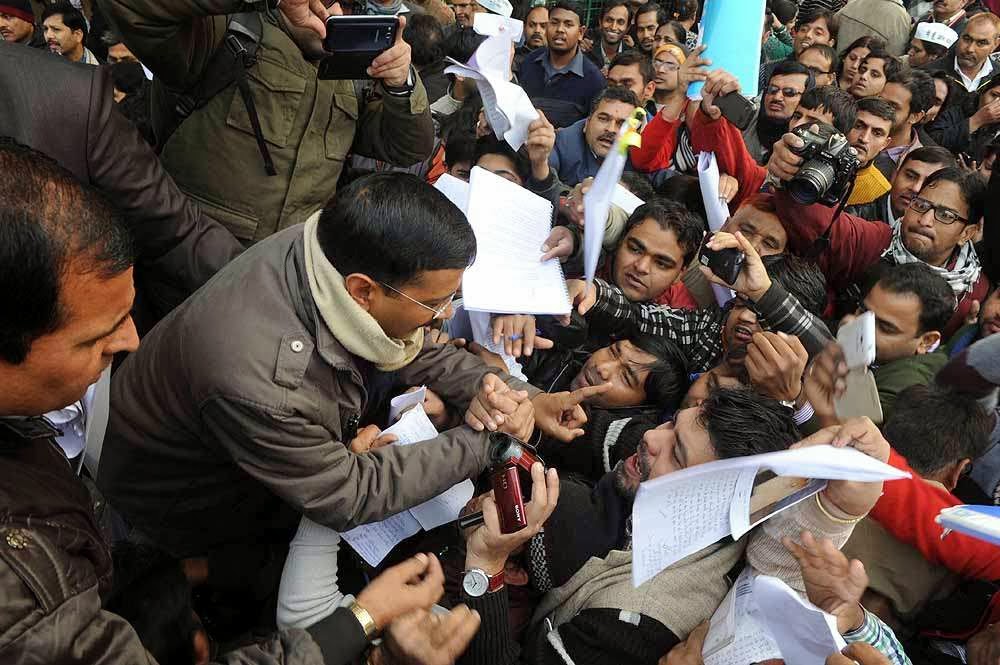AAP (Aam Aadmi Party)
led by tenacious Arvind Kejriwal arrived on Indian political horizon with a
bang on Dec 8, 2013 winning 28 out of 70 seats in the Delhi Assembly elections finishing
behind BJP who got 32 seats. The vanquished party (Congress) in a tactical move,
not liked by many Congressmen offered them unconditional support and Arvind
Kejriwal became 7th Chief Minister of Delhi embarking on his maiden legislative
journey amid great excitement of his supporters and grave concern of
detractors.
Leaving behind those
nightmarish episodes, Kejriwal should focus on administration so that he can
showcase his achievements of first 100 days in power- the usual honeymoon period allowed to a
new government. As he does not have a magic lamp, he should set a modest
target and focus on those items from his extensive laundry list which are less
complicated and can be done within a short period. Apart from water, power
and public transport, issues affecting the lives of common man like Govt
hospitals/schools, roads, women's security, rain water harvesting should be on
his menu. Rather than tinkering with the existing system, he could open up the
system itself and show its functioning to the public using modern IT tools, something
like an open kitchen. But he should refrain from conducting official business in maidans and stadiums instead of Assembly and Secretariat.
Resorting to acts of symbolism, populism and gimmickry will not fetch his party
extra votes and he may become all hat and no cattle. Unguarded comments (on
Kashmir and Maoists), sweeping remarks (on corrupt politicians), indiscriminate
announcements (on Khap panchayat)
will spread confusion and bitterness. He will be lost in the warren
of narrow vision if he tried his hands at too many things. Kejriwal would
do well to remember the golden saying, "One thing at a time and that done
well, is a very good rule as many can tell".
A word about the man of the moment - Kejriwal started his career in 1989 with Tata Steel after finishing IIT, joined IRS in 1995, founded an NGO Parivartan in 1999 while still in Income Tax Department which he left in 2006, was associated with RTI, Jan Lok Pal movements, participated in Anna Hazare Movement in 2011 and parted ways to form Aam Aadmi Party in Nov 2012. He is young, courageous, street smart and media savvy but the way he fell out with his mentors like Aruna Roy and Anna Hazare and former comrades like Kiran Bedi betrays his individualistic streak.
Kejriwal is not an
'Anarchist' and after becoming CM, he is no longer an 'Activist'. He should
also not dream of bringing a political revolution in India because he lacks the
vision, stature and charisma of intellectual giants from Trotsky (Permanent
revolution - 1905) to JP (Total Revolution - 1974) who exhorted the masses to
bring a revolutionary change in people's life but failed to bring the new dawn.
Even movements like Arab Spring (2010) and Anna Hazare (2011) which engendered
mass protests and generated great hope could not succeed in improving the
living conditions of common man. As a full-fledged politician his priority
should be to provide a clean government, devoid of functional anarchy, in
Delhi. It would not be easy as both his unwilling accomplice (Congress)
and those who missed the chair by a whisker (BJP) will make things difficult
for him.
To replicate the Delhi experiment
in other parts of India, he would require a cadre-based party which may
take years to build but that is the right way to go. A proper screening would
eliminate fake members and prevent those trying to leap on its bandwagon. Past
experience has shown that political leaders and parties take time to
grow and mature. Today's strong regional parties like SP, BSP, AIDMK, TMC,
TDP, BJD and their leaders have been in existence for decades. Drawn into the
vortex of real politics, always a treacherous terrain, Kejriwal will need
patience and nerve to play a long innings as in a 5-day test match rather than
its shorter version of T-20. If AAP can win even a dozen seats in 2014
elections and about 5% popular votes on its own, people will forget its
cacophonous beginning and hope for an amazing symphony in 2019. Failure to do so will merit soul-searching and taking AAP back to basics or disband it altogether and rejoin the biradari of activists.
Also see: The Kejriwal phenomenon
Also see: The Kejriwal phenomenon




